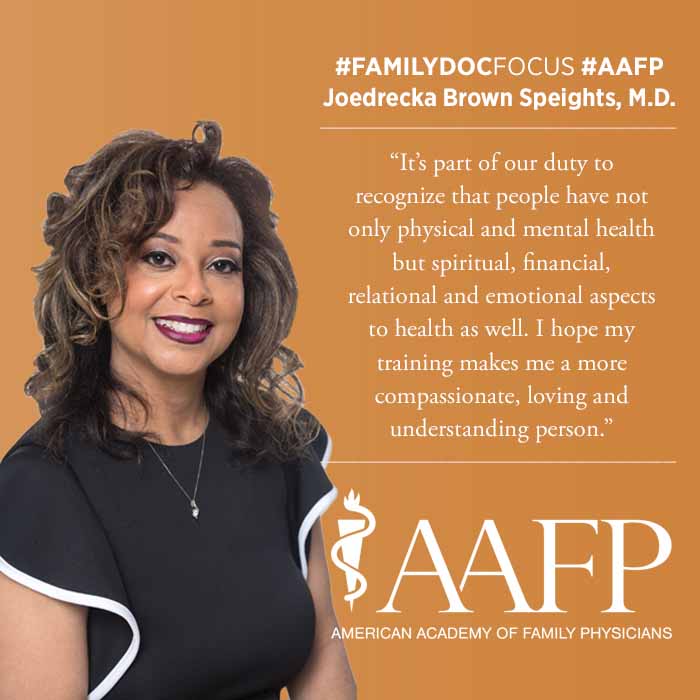Called to Heal: FP Ministers to Both Patients and Society
July 13, 2020 03:57 pm David Mitchell – Family medicine residency alone would have been rigorous enough for most people. During three years of training, residents complete rotations in obstetrics, pediatrics, general surgery and inpatient hospital care; care for patients in continuity clinics; take call; complete Step 3 of the U.S. Medical Licensing Examination; apply for state licensure; look for postresidency jobs and more.

But Joedrecka Brown Speights, M.D., wanted her education to be about more than medicine. While she was a resident at St. Vincent's Family Medicine program in Jacksonville, Fla., she also earned an ecclesiastical doctorate in theology at a local seminary program.
"I wanted to feel well-rounded and grow," she said. "It was about personal enhancement and spiritual health. I grew up as a pastor's kid, and my husband did, too. Two years ago, my dad passed the baton to us with his ministry. We work together as team."
That doesn't mean Brown Speights preaches to her patients.
"It's part of who I am, but I don't come into the exam room as a pastor with an agenda," she said. "I let patients take the lead if they want to bring faith into the health care space. It's part of our duty to recognize that people have not only physical and mental health but spiritual, financial, relational and emotional aspects to health as well. I hope my training makes me a more compassionate, loving and understanding person."
Brown Speights does most of the work related to her small congregation during the evening hours and on weekends. Her full-time job is serving as chair, professor and clinician in the Department of Family Medicine and Rural Health at Florida State University College of Medicine in Tallahassee.
And she's still learning. In 2017, she completed a health equity fellowship at George Washington University.
"The fellowship resonated with what was important to me," she said. "I've always been driven to think about the conditions beyond health care that contribute to some people not being well. That holistic approach is what drew me to family medicine. We need to move beyond identifying the problem and understanding the differences in health outcomes based on gender, race and socioeconomics and build a positive framework to achieve something better than where we are right now."
Brown Speights said the international fellowship provided an opportunity to learn from professionals in other sectors of medicine and public health with a wide range of backgrounds and experiences.
"I wanted to be better at what I do and have more tools to address health equity," she said. "It was an opportunity to enhance my knowledge, skillset and understanding. It influences my lens, how I see things, and how I talk about and approach curricula, patient care, community engagement and innovation."
Brown Speights said more people have become aware of disparities in our health system during recent protests.
"Calls to action have really been expanded, and people are responding," she said. "I hope people will continue to engage and not just see this as a moment in time. Many people are looking to improve health care delivery and the system for patients and physicians."
Brown Speights said she hopes she can help clinicians become more aware of bias in health care, with the goal of improving patient outcomes. She'll participate in a panel discussion on community engagement and social justice during the virtual FUTURE (formerly National Conference of Family Medicine Residents and Medical Students) July 30-Aug. 1. She said students and residents can be advocates for patients not only within their health care systems but also in their communities.
Brown Speights called for the creation of a culturally proficient workforce that's responsive to patient needs. "We need to and can do better in the area of health equity through equipping ourselves and addressing systems that allow us to value everyone, provide resources according to need, and undo historical and modern day injustices like racism that present as barriers to health for all," she said.